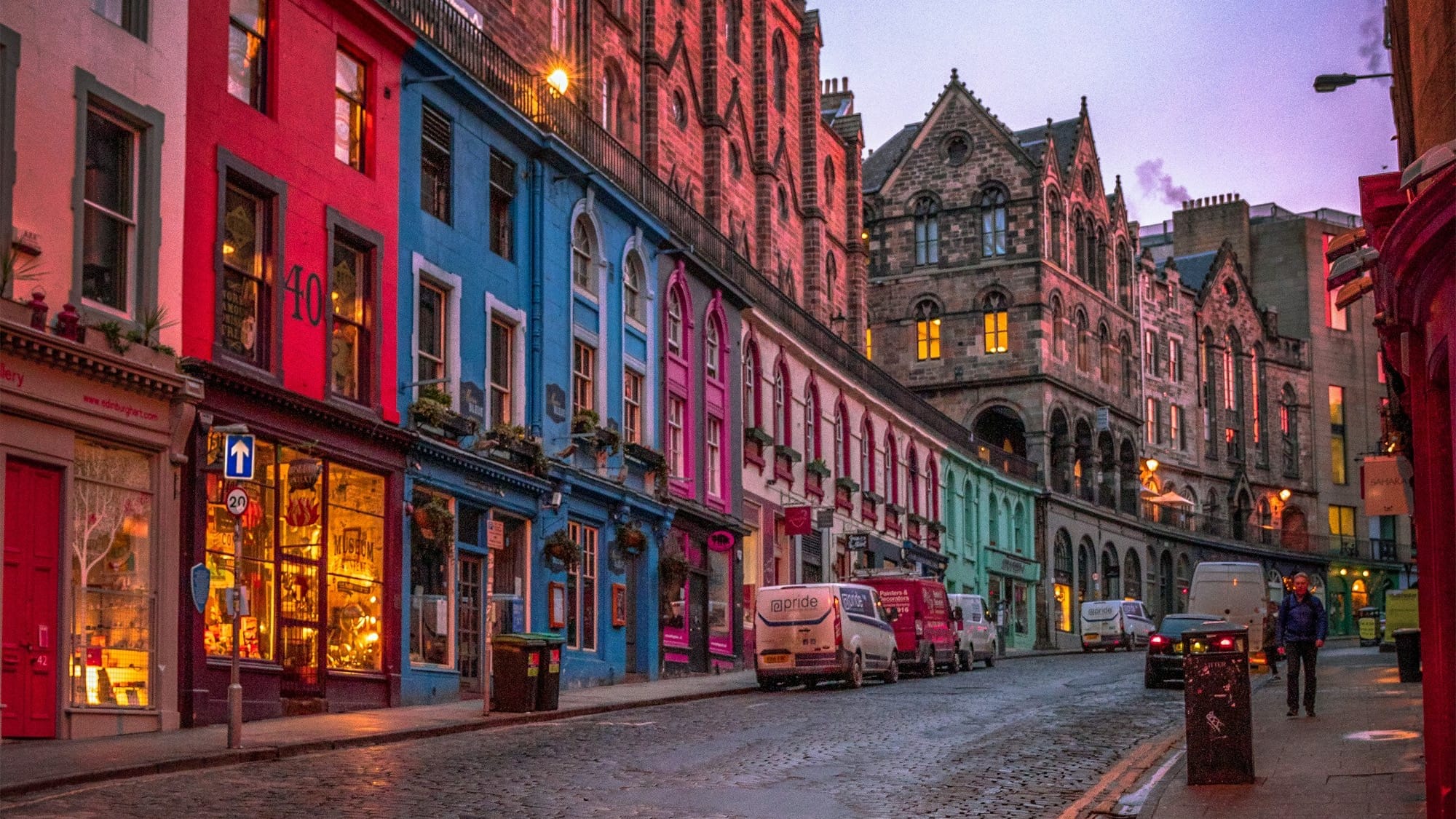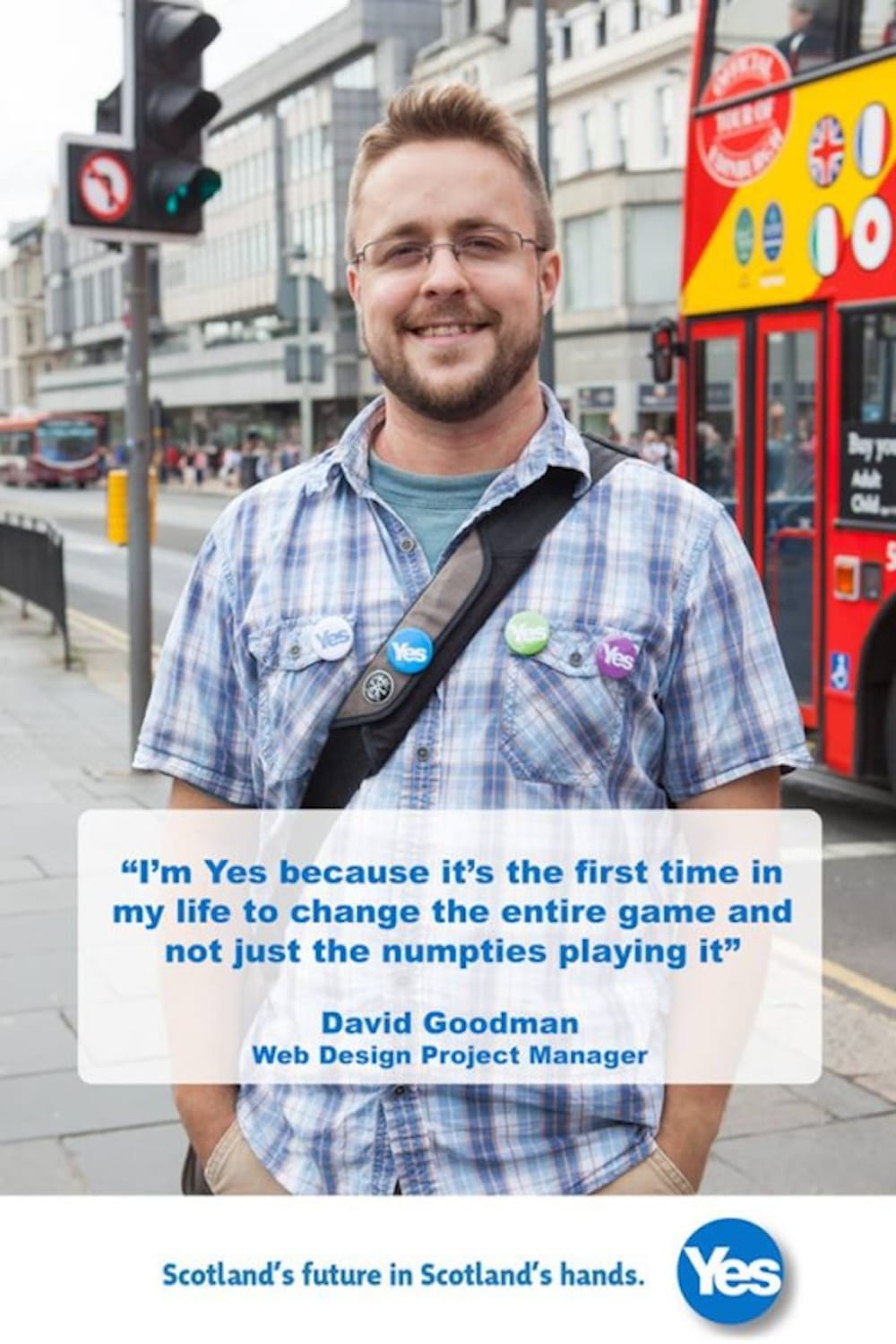A final case
We’re down to the wire now. By the time I publish this, there will be less than 30 hours until the referendum.

I await the result now with a sense of impending relief. The rhetoric has really ramped up over the last couple of weeks after an apparent reversal of the polls last week, which sent the Westminster parties into a last minute scurrying panic (or doughty Defence of the Union, depending on your perspective).
Indeed, that sudden narrowing of the polls has cast into stark relief the long shadows of the Scottish political landscape, as the great glowing eye of the United Kingdom’s politicians and media swivelled to focus on us fully for the first time in years.
No doubt some No voters felt bolstered by the deluge of love and hate bombing, but for me it merely hardened my resolve. I suspect the sheer number of promises, threats, lies and blatant bullshitting may have nudged more people to Yes out of anger than it frightened or seduced people to No.
But anyway. We’re nearly there. I’ve given a bunch of reasons, then a bunch more. I’ve written about the feeling of the last forty days of the campaign. Then I finished up with my experience of my first ever political campaign. And I’ve tweeted, Facebooked and generally talked my arse off. I’m knackered, but I think I may have changed a few minds, or at least provided a case for Yes that didn’t come solely from a campaign leaflet.
But I thought I’d have one last go, to try and distil the case for Yes as well as I can. Sorry, this is another long one.
A Yes vote is an objective, but also a starting point
There’s been a link going around the last couple of days from a chap called Ewan Morrison, in which he talks about the apparent zealotry and intolerance of dissent that he encountered when joining the Yes campaign, which finally prompted him to join the No side. He sees parallels with the Trotskyist movements of the Eighties, where there was no politics allowed, because the focus was always on ‘achieving revolution’.
It’s an interesting link and a criticism I’ve seen from a number of quarters. Oddly, a few months ago the critique started by deriding Yes overall as an SNP front with a few tiny schooling fish to placate various interest groups like Greens and Socialists. Then, as the flash mobs and window signs and impassioned blog posts began to pile up, it became characterised as a dangerous, directionless expression of ethnonationalism, because large groups of people with flags (except in Trafalgar Square, natch) are always a Very Bad Thing indeed.
There’s also this rather strange idea that the purpose of the Yes campaign must be to provide a complete, totally settled picture of what Scotland should be like, so that it can be measured up against what Scotland is within the Union. As a demand from the No side, it reminds me of the general response to the Occupy movement. YOU MUST COME TO US WITH A LIST OF DEMANDS, BLOODY HIPPIES, mumble-can’t-even-organise-a-revolution-properly-grumble.
That’s both impossible, given the number of people involved from across the political spectrum, and not the point. The point is to create the arena, peacefully and democratically by referendum, in which those arguments can be had, precisely because we feel that the conversations we want to have cannot be had within the current political and social context of the wider UK.
That’s the problem with exploding grassroots campaigns - they’re leaderless and a bit chaotic, which is unsettling for someone who wants a single, settled idea they can get behind, a united vision for the future. Ewan Morrison was looking for a united and clear party political election campaign, but he found a rough and tumble constitutional debate where many, many of the questions he wanted answered can’t be answered until the forum is secured.
Scotland will not be ruled by the Yes campaign or any of its component parts after a victory. We’ll have built our own chamber, and be free to take sides in it. That’s the entire point.
This is not an election and I’m not voting for a social welfare policy
Another, and frankly wounding, criticism I’ve had personally is that I’m a nice, well meaning lefty, but that I’m voting for a pipe dream because I believe it’ll help the poor wee folk in the housing schemes, while it’s beyond my capacity as a speccy middle class twat to understand what I’m actually doing is hurting them and deepening their dependency.
Firstly, I believe very strongly that the current punitive approach to welfare provision in the United Kingdom is at least partially the cause of our current state of affairs. We treat benefit recipients like schoolchildren to be scolded, then we sanction them and leave food banks to fill the gap.
Warning - this is a deeply upsetting video, but I urge you to watch it.
That people are going days without food in a modern democracy is a disgrace that offends me to my core.
I saw a comment on Twitter recently that crystallised this for me. It was this:
Some phrases endure as markers of our degradation. 'A pile of CVs was found next to his body' is one of them. http://t.co/V82KIMG3ll
— James B (@piercepenniless) September 10, 2014
This is sickening. The poor are not, actually, 'the poor’. They are not a seething mass, somehow less capable or less worthy of life. They are people. They make the choices available to them, and sometimes they make shit choices, like taking a drink, or an illegal drug. But those choices, while they might sometimes exacerbate a situation of poverty and desperation, are not the cause of that poverty. They are a symptom of the need to escape. The well-to-do snort cocaine from club toilets (or neck Sauvignon Blanc at dinner parties) to escape their boredom and their crushing working hours. If you think that someone with less money than you deserves no escape, needs to be managed like cattle, can’t make decisions for themselves, you’re a hypocrite.
Personally, I favour giving money to people with less of it. I believe that the best people to judge how money is spent are the people who need the money. I don’t get to judge, and neither should you. Because if we get better results from providing international aid by giving money directly to Kenyan villagers, why wouldn’t we by putting money directly into our own housing schemes?
My favoured system is one called a 'Mincome’ or a Citizen’s Income, as advocated by the Scottish Greens. It’s a radical change, but it’s one I’d be free to argue for within an independent Scotland. It’s also proven to have positive outcomes and would be cheaper to run, destigmatising and more effective than our current punitive, means-tested system.
But I’m not voting for Mincome. I’m voting for the venue where a discussion of it will become possible.
Believing in change within the Union
As I write this, another effort by the three main party leaders is in the process of disintegrating. The so-called 'Vow’ that filled the front page of the Daily Record was a promise to both devolve unspecified 'further powers’ that stop short of the devo max that’s not on the ballot and maintain the Barnett formula on spending. But even before the vote, it’s already being picked apart by backbench Tories.
Never mind that postal ballots have already been cast and this perilously skirts the rules (and in my opinion, flagrantly breaks them) about what can be offered and when in a referendum. Never mind that.
I simply don’t believe it. It’s not a real thing. It’s bullshit. It’s barely a campaign promise (already refuted multiple times by Tory backbenchers, remember) of a shaky three-party coalition of the unwilling that doesn’t even give us the start of anything like federalism, just a promise of a sop that will only anger England and Wales, rightly, because it’s not more powers, it’s a barely coherent bribe that merely entrenches the existing problems with devolution.
If a truly federal Britain were on the cards, at all, it’d have been offered years ago. But it’s simply not.
Here’s the excellent @PeatWorrier on what this really is:
But for the nervous gestures, the manipulative and hollow trick of rechristening bloodless Calman-plus plans “devo-max”, and hastily drawing up a timetable to realise these very, very limited new autonomies, none of this has any credibility. A federated United Kingdom is a plan without a constituency, without a committed political proponent, without any depth of support across much of Britain, running contrary to the declared instincts of politicians from both big London parties, faced with a dizzying array of rhubarbing and powerful dissenters on both the Labour and the Tory benches.
By contrast, I can literally taste the shakeup that a Yes vote would afford. It’s right there. And I believe that by grasping that opportunity, we also stand a good chance of provoking and encouraging similar democratic awakenings in England, Wales and Northern Ireland. Because make no mistake, this has been an awakening.
We have the opportunity to change the whole game. We must take it.

Post from I’m Yes Because
Politics can be for all of us
This is the first time in my life I’ve ever done anything real, politically. It’s been deeply exciting and inspiring to see politics move back into the public sphere, where it should be.
For far too long, our collective malaise has left us with the idea that there’s only two kinds of people who get involved with politics. Slick, professional politicians in carefully managed press conferences, and the loons with the placards outside who should just get a job, or, like, whatever.
But it’s a lie. Politicians say that they want engagement. But what many of the managerialist PR people who run our politics actually want is tiny marginal constituencies they can win with a couple of speeches and promises vaguely in line with the slow-moving sensibilities of the Home Counties. Real engagement, of the kind we’ve seen in this campaign, scares the shit out of them. Because it’s unpredictable. We’ve got 97% voter registration for this vote. I’ll say that again. Ninety-seven percent. That is completely unprecedented and it is a thing of wonder to me.
One of my greatest fears is that the significant numbers of people who have been pulled from their political torpor, especially on the Yes side, lulled over years into thinking they cannot make decisions for themselves and don’t deserve to, will have that suspicion confirmed. They’ll vote and the screamed warnings of the bankers, corporate press and Westminster politicians will have worked anyway. They’ll shut themselves up again behind rain-streaked windows, pack their hopes up and lose themselves and their political power for another generation.
If it’s a No, I really believe we’ll be back here again in ten years, only we’ll be poorer, angrier and we’ll all have a lost a decade (or maybe longer) in which we could have been governing ourselves and building a society that matched our priorities, instead of those of a post-imperial unitary state that is slowly hollowing itself out with free market absolutism.
We’ll be okay
I want to close with a reassuring note. I’ve seen a few friends and relatives, mostly on the No side, as well as a bunch of internet comments and editorials, that have predicted a divided society in Scotland’s future, especially in the result of a close No vote.
I posted this on Instagram the other night, and I fundamentally believe that it’s true.
Also, this weekend, between leafleting and grabbing a bit of lunch, I found myself wandering around the beautiful modern sandstone environs of the National Museum of Scotland.
As I often do, I wandered down to my favourite part, the Early Peoples floor, down in the basement. It has an incredible collection of artefacts that date back to the earliest archaeological finds we have, evidence of human settlement that dates back more than 8,000 years.
I wandered from case to case, tracing the curving patterns on Pictish stones, gazing at piles of flint arrowheads, early iron jewellery, ceremonial skulls. I thought about the days when the land was blanketed with forest, the century upon century of slow, careful progress, as generation after generation made things a little better, planned and built and fought for a little more comfort and security.
We’re another link in that chain. We can be sure that this land will go on without us eventually, but while we are here, we have to try and make the best of what we have, look after each other and bend the arc of history towards a better life for as many of us as we can manage. I believe that independence offers that chance for the people of Scotland and will strengthen the chain, not weaken it.
I dearly hope you’ll join me in forging the next link.
